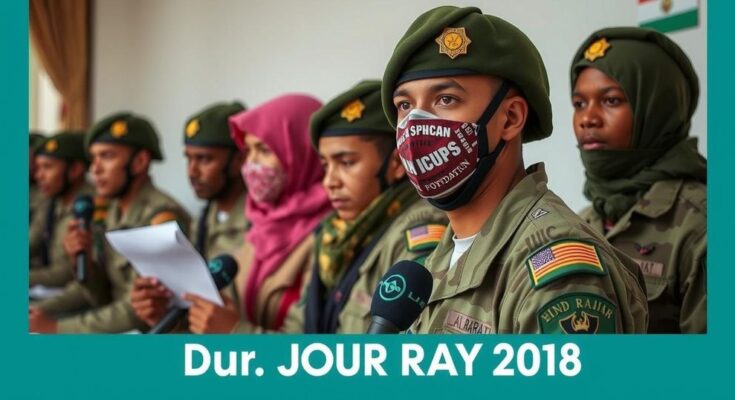The Hind Rajab Foundation has filed complaints against IDF soldiers for alleged war crimes, prompting legal action in Brazil. The foundation seeks to hold military personnel accountable, leveraging social media as evidence. Founded by anti-Israel activist Dyab Abou Jahjah, it aims to challenge Israeli actions through high-profile legal campaigns while drawing attention to alleged war crimes in Gaza. Its leaders have made controversial statements regarding Israel and historical events.
The Hind Rajab Foundation (HRF), based in Belgium, has recently initiated legal actions against Israel Defense Forces (IDF) soldiers. Last week, they filed a complaint against a soldier vacationing in Brazil, accusing him of involvement in war crimes, specifically “massive demolitions of civilian homes in Gaza.” Following this, a Brazilian Federal Court has opened an investigation into the soldier’s alleged actions during the ongoing conflict. HRF has made headlines for targeting IDF soldiers with doxxing and legal campaigns, citing social media postings as evidence for their claims.
The HRF claims their mission is to conduct legal offensives against those they hold responsible for war crimes and to raise awareness regarding perceived Israeli impunity regarding these actions. Recently, their focus has included soldiers relaxing in the Netherlands and the United Arab Emirates. Notably, in November, the foundation urged the International Criminal Court (ICC) to issue arrest warrants for approximately 1,000 IDF soldiers, asserting they have gathered substantial evidence of war crimes and other misconduct.
The foundation is named after a six-year-old girl killed in Gaza and is linked to the March 30 Movement, which advocates for the acknowledgment of genocide in Gaza. Its founder, Dyab Abou Jahjah, hails from Lebanon and is notoriously known for his anti-Israel sentiments, having a history of support for militant groups such as Hezbollah. In recent social media commentary, he has made statements regarding the leadership within Hamas, framing their deaths as a testament against Israeli actions. Furthermore, he has controversial views on historical events, having referred to the September 11 attacks as “sweet revenge” and expressed Holocaust denial.
Kareim Hassoun, the HRF’s secretary and former chairman of the Arab European League, has similarly controversial statements on Israel and the conflict, emphasizing that recognition of Israel would not occur under his tenure. His comments have often echoed sentiments that deny the legitimacy of Israel as a state. The HRF continues to position itself prominently in the ongoing discourse surrounding the Israel-Palestine conflict, highlighting their activities in legal advocacy against IDF personnel.
The Hind Rajab Foundation, named after a young victim in the Gaza conflict, has emerged as a significant player in the legal and advocacy landscape surrounding the Israel-Palestine issue. By targeting IDF soldiers and calling for international attention through legal channels, it aims to hold perceived perpetrators of war crimes accountable. This foundation’s origins and leadership have drawn scrutiny, highlighting a broader narrative around anti-Israel campaigns and the arguments employed in the ongoing conflict discourse. The involvement of controversial figures in the organization further complicates its public perception, particularly related to their interpretations of historical and contemporary events. The foundation utilizes a broad strategy of collecting data and evidence to support their claims while engaging with international judicial systems to amplify their voice against Israel. Their actions coincide with a concerted effort among various organizations to lobby for legal repercussions against military personnel in contentious regions, raising questions about the ethics and motivations underlying such campaigns.
The Hind Rajab Foundation represents a significant and controversial entity in the realm of legal actions against IDF soldiers accused of war crimes. With its operations extending across various countries and its claims of evidence against many military personnel, it continues to provoke discussions around accountability in the Israel-Palestine conflict. The background of its leadership and the nature of its campaigns indicate a strong anti-Israel stance, underscoring the complexities of advocacy and legal action in entrenched geopolitical conflicts.
Original Source: www.jpost.com




